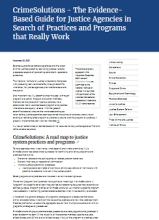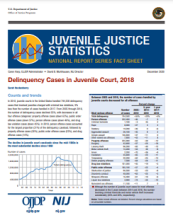Inmates/offenders
Cognitive Behavioral Theory, Young Adults, and Community Corrections: Pathways for Innovation
No Suspect Casework DNA Backlog Reduction Program FY 2001 (Connecticut)
DNA Backlog Reduction Program - FY 2001
Booker and Beyond Analyzing Sentencing Reform and Exploring New Research Directions
This webinar features a discussion of previously published research on the U.S. Supreme Court’s 2005 Booker decision - which effectively transformed the United States Sentencing Guidelines from a mandatory, to an advisory, system. The presentation will address selected research findings from the last 15 years. Individual participants will briefly review their previous research findings with particular attention paid to the analytic methods used.
See the YouTube Terms of Service and Google Privacy Policy
Multilevel Evaluation of Project Safe Neighborhoods
Project Safe Neighborhoods (PSN) is a DOJ-sponsored initiative to reduce violent crime, particularly gun crime, by fostering cooperation by criminal justice agencies and local partners to develop and implement strategic approaches.
See the YouTube Terms of Service and Google Privacy Policy
CrimeSolutions - The Evidence-based Guide for Justice Agencies in Search of Practices and Programs that Really Work
Desistance From Crime: Implications for Research, Policy, and Practice
Most scholars would agree that desistance from crime – the process of ceasing engagement in criminal activities – is normative. However, there is variability in the literature regarding the definition and measurement of desistance, the signals of desistance, the age at which desistance begins, and the underlying mechanisms that lead to desistance. Even with considerable advances in the theoretical understanding of desistance from crime, there remain critical gaps between research and the application of that research to practice.
See the YouTube Terms of Service and Google Privacy Policy
NIJ Multisite Impact and Cost-Efficiency Evaluation of Veterans Treatment Courts, Fiscal Year 2022
Deadline Notice
The deadline for the funding opportunity discussed in this video has passed.
See the YouTube Terms of Service and Google Privacy Policy
The Covariation of Sexual Fantasies and Behaviors Among Self-Identified Sexually Aggressive Criminal and Noncriminal Samples
Paraphilia and Antisociality: Motivations for Sexual Offending May Differ for American Whites and Blacks.
The Impact of State Firearm Laws on Homicide Rates among Black and White Populations in the United States, 1991-2016
Preventing Hydrolytic and Oxidative Damage to Biological Evidence with Antioxidants and Chelators
Redesigning Risk and Need Assessment in Corrections
School Safety: A Focus on Teachers and Administrators - Breakout Session, NIJ Virtual Conference on School Safety
On February 16-18, 2021, the National Institute of Justice hosted the Virtual Conference on School Safety: Bridging Research to Practice to Safeguard Our Schools. This video includes the following presentations:
See the YouTube Terms of Service and Google Privacy Policy
The Impacts of Restrictive Housing on Inmate Behavior, Mental Health, and Recidivism, and Prison Systems Personnel
Risk and Needs Assessments in Prisons: Identifying High-Priority Needs for Using Evidence-Based Practices
Altering Administrative Segregation for Prisoners and Staff: A Mixed Methods Analysis of the Effects of Living and Working in Restrictive Housing
Delinquency Cases in Juvenile Court, 2018
Juvenile Residential Facility Census, 2018: Selected Findings
Research on Forensic Toxicological Laboratory Testing and Reporting Practices
Research on Forensic Toxicological Laboratory Testing and Reporting Practices
Expanding Research to Examine the Impacts of Forensic Science on the Criminal Justice System
In 2004, the National Institute of Justice created the social science research on forensic sciences (SSRFS) research program to explore the impact of forensic sciences on the criminal justice system and the administration of justice. Much of the early research from the SSRFS program focused on DNA processing and the use of DNA in investigations and prosecutions.
See the YouTube Terms of Service and Google Privacy Policy




